Continuing our series on the amazing below-the-line artisans working on Prime Video’s The Lord of the Rings: The Rings of Power, which recently wrapped its first eight-episode series, we next have the orchestrating team of Tutti Music Partners — Ed Trybek, Jonathan Beard, and Henri Wilkinson — who have performed their duties for a number of composers we’ve spoken to in the past, including Michael Abels and Tom Holkenborg.
The role of the orchestrator on a movie or television show can be critical, especially in the case of The Rings of Power, which required Composer Bear McCreary to write a ton of music for what amounts to an eight-hour epic, so the score plays a major role in enhancing both the emotions and the excitement inherent in J.R.R. Tolkien’s storytelling. The guys from Tutti not only orchestrated Bear’s scores but also produced the sessions to record the mostly orchestral music.
Below the Line hopped on Zoom with the three members of Tutti Music Partners, mainly to discuss their work on The Lord of the Rings series, and everything that entailed.
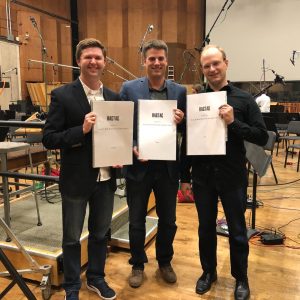
Below the Line: I’ve spoken to many composers for Below the Line, but maybe for those reading this who aren’t as familiar, could one of you talk about the differences between orchestrator and arranger, and the duties of each?
Ed Trybek: If we go by the basic definition [of] an orchestrator, our responsibility is to create a full score that the conductor can use and parts can be transcribed from. We’re responsible for the final lines and dots, if you will. I would say a good analogy is an orchestrator to a composer is like an engineer to an architect. So, you can have an architect, who has drawn up blueprints that are so detailed that you’re literally just copying from one piece of paper to another, effectively. And you’re literally like, “Oh, we need more space for this air duct here,” and we’re just saying, “We’ll make that English horn for this one moment,” or something like that would be sort of the equivalent. On the other hand, you have some people who are more like, “I see a 300-foot tall, green egg. Go!” It’s a very wide swath, and when you get into the “green egg” territory, you’re leaning more into the arranging side. Although an arranger can do something that’s maybe not so much about all the nitty-gritty details that we have to worry about on our end.
Jonathan Beard: If there’s a spectrum of the job of orchestration, it probably goes from arranging is that “green egg” side. The other side of the metaphor I was using would be close to almost being a very detailed transcriber. The work of orchestration can, in practice, span that whole swath of transcription on the one side to arranging on the other.
BTL: In terms of your own musical backgrounds, I’m curious about what instruments each of you plays. I see Ed has a lot of guitars behind him, so do any of you play stringed instruments, or are you more keyboard-oriented?
Beard: I’m a cellist by trade. That is my primary instrument. There are some other secondaries, but that’s the important one.
Henri Wilkinson: I play jazz piano. In fact, I’m playing The Grape in Ventura on Friday, so I still play some jazz piano now in bands and stuff like that. That’s where I come from, and like you said, Ed, he has a Ph.D. in guitar.
Trybek: A doctorate, it’s not a science one. It’s a DMA (Doctor of Musical Arts). Classical guitar would be my primary instrument, but I started playing guitar because of rock and roll, and my parents had the foresight to say, “You’re gonna study classical and jazz and a little bit of piano, as well.” Guitar’s my primary instrument. I used to do more studio work where I would play other stringed instruments like mandolin and lute, including for Bear on things years ago. Our work has exploded in terms of orchestration and conducting, and alas, the playing of guitar has been relegated to Baby Shark and Twinkle Twinkle for my children. [laughter]
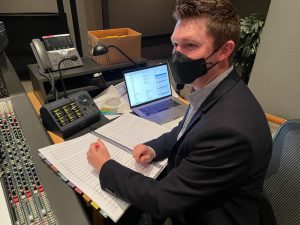
BTL: Are you all in the same general area, so that you can work together?
Beard: We’re spread out over the greater Los Angeles region. There must be some reason that that’s good for business. I don’t know. We’ve got far east side, east side, and West Side. I’m in Santa Monica, Henri is in Eagle Rock, and Ed is in Pasadena. But how should we put it gently? It’s very important we meet for in-person business meetings at our favorite gastropub.
Wilkinson: Since the COVID hit, we actually continued the tradition, but just with virtual zooms. When COVID started, my wife right away had these mom’s clubs set up for all of these virtual meetings, so then we had the idea of why don’t we start the same thing? Since we can’t go out and see each other in person, let’s just have a weekly business meeting anyway. [Does air quotes] “Business meeting.” Business is discussed, which we’ve still carried out the tradition.
BTL: You’ve all worked with Bear McCreary for some time. I’m not sure if it was in different capacities, but was it always together as a group, or was Tutti something that formed as you went along?
Beard: We formed it officially later, but we all got hired within a few weeks of each other in 2009, and it’s through Bear, actually, we originally met. He had so much television work, at the time, that we were just working week in and week out with each other all the time and got a really good feel for how to work together. That evolved over time until we formalized the partnership.
Trybek: Those “business meetings” started in 2009, so we got along personally, as well as musically.
BTL: What’s your process like? What does Bear send you? Is he sending you MIDI files, and how do you three split up the duties and work together?
Trybek: Firstly, I tried to take all the really easy whole note cues that are just flute, unless Henri and Jonathan disagree. [laughter] We try to split things up equitably. I mean, obviously, that’s sort of our process, and it developed out of TV work because the schedules always tend to be tighter. Rings of Power, I would argue we had more time than most TV shows, but that was negated by the scope of the music Bear was writing, because it’s full-on, old-school fantasy — a massive musical score. Bear has said that he spent a lot of time writing. He wrote every single note himself, and so generally speaking, yes, we had a MIDI file and various audio stems split out, and from that, we created the score. He will always have a lot of markers for us about specific musical things he wants — touches or clarifications of things that might be unclear in the MIDI, maybe.
Wilkinson: That’s the middle part of the process, in a way, because the way we work, especially on this project, we started working with Bear several months before we actually started the orchestration, just in terms of going over some of the ideas that he had already developed, thematically. He was expressing some of the backgrounds of the musical examples that he was going for that we could reference. The work process started a lot earlier than the actual orchestration process itself. Of course, after completing an orchestration process on a computer screen, it doesn’t end for us there, because then we still get to be part of producing the score at the sessions, which is very interesting as well.
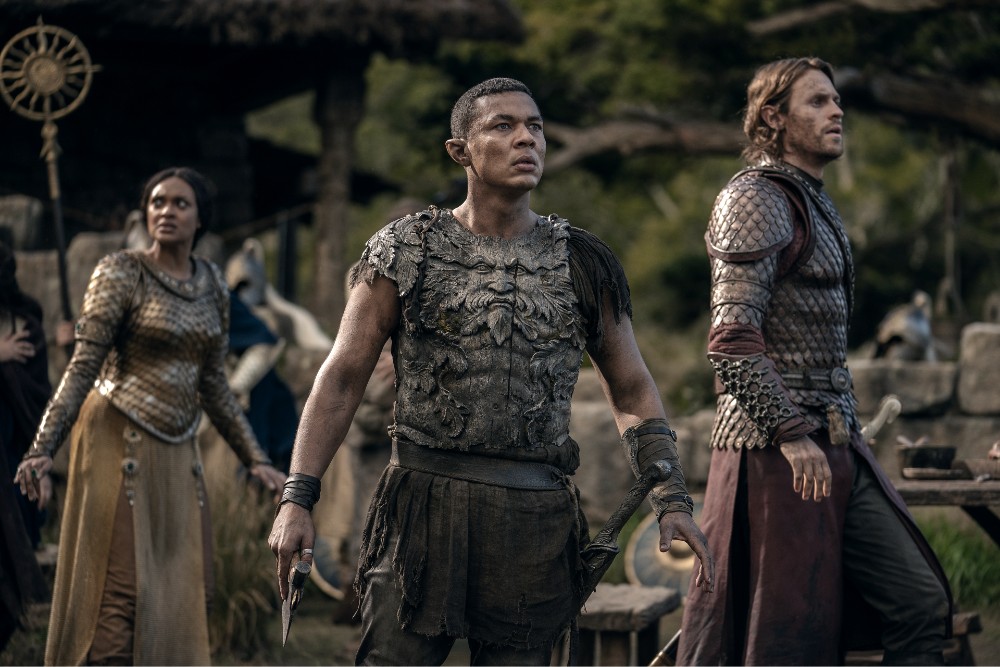
BTL: Is this something very common that you guys have been doing this whole time, or is this just something due to the scope of the project?
Beard: It is fairly common for us to be involved at the scoring stage, both literally and in the stage of the process in some capacity. Depending on the composer, it may vary from them actually wanting us to run things, to just being there to chime in if we see something that we’re wondering, “Well, is that really what you want?” Or to just be there to fix, if revisions are needed really quickly, then it can be quite valuable for us to be there. What was a little bit different in this case — and we’ve had a very comfortable relationship with Bear in that arena over the years. He’s super-involved with what he wants, and he knows what he wants and is usually producing a session from the podium himself. If he can, he likes to be conducting the orchestra. What was weird about this one was because of the incredibly-condensed time schedule for how much music there was on each episode. He literally didn’t have time to be there episode to episode, because he already needed to be on writing the next episode.
Trybek: Each episode is a minimum of four full days of recording, so multiply that times eight, [and] that’s a month.
Beard: Exactly. The fact that he had enough trust in us to say, ‘Guys, I’m going to turn over the production of these sessions to you. You run it, I gotta go work. Text me if there’s a problem.’ That was really cool that we have that relationship with him, and that we can take that on.
BTL: At that point, when you get to the recording, are you recording it to picture at that point, or not even?
Trybek: Not in this case. Generally, yes. The secrecy on this one was so high that there was absolutely no picture being shown at the session. We weren’t allowed to put cue titles on any paper. Everything was under code names. So it’s just like, “Oh, this is one of one, this is five and 10.” It was just completely opaque.
Beard: No project title, no cue titles.
Trybek: That being said, there may have been some people who figured it out, maybe at the choir session, for a few people who maybe knew or just like, “This looks a lot like a language that I’m a huge fan of.” And we’d be like “Ixnay on Elvesay.” [laughs]
Bear: There are super-fans everywhere.
Wilkinson: We did get that question, especially at certain choir sessions. A couple of times, the conductor and the singers were like, ‘What language is this?’
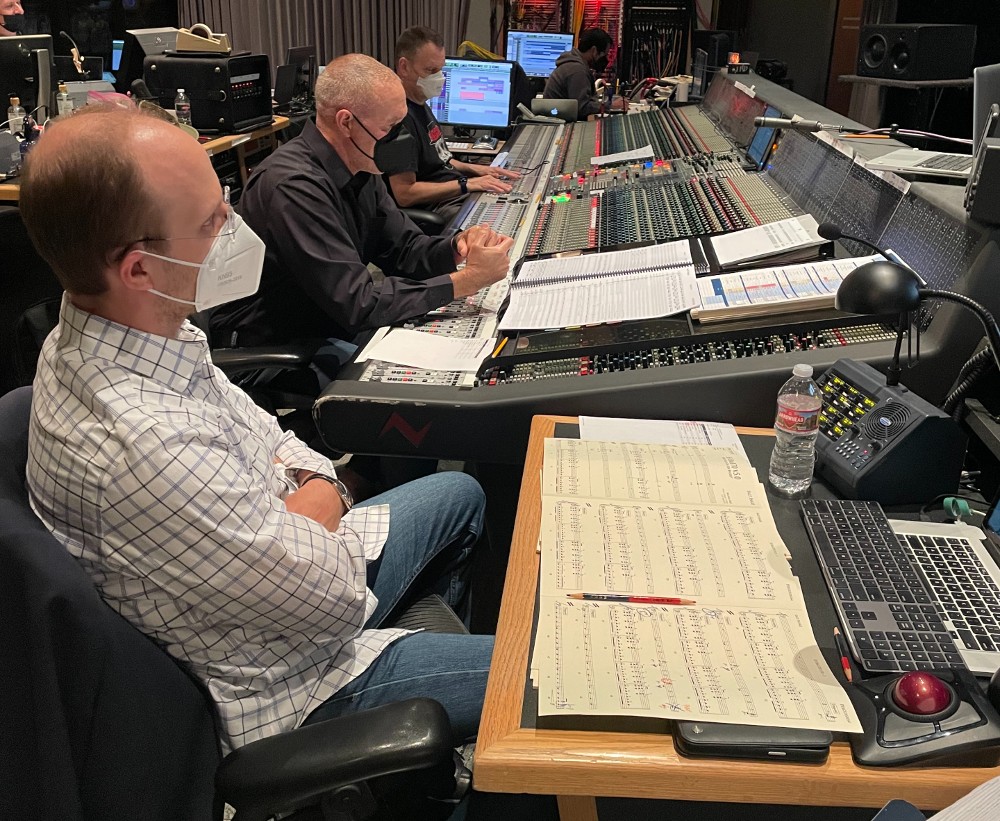
BTL: Are all the words and lyrics from the Elven language that Tolkien created?
Beard: Multiple Tolkien languages, but yes, all the words you’re hearing the choir sing — and the choir is quite present in the score throughout the season — those are all in Tolkien languages, appropriate to the different characters.
Trybek: There’s Dwarvish. There are a lot of languages, and I believe there were numerous language experts involved in getting this all sussed out properly.
Beard: We couldn’t tell the choir what language it was to sing, but from those language experts, Bear’s team would record an actual pronunciation guide from a language expert, which we could have ready to go and play for the singers, so they could hear the pronunciation. That helped get us around being able to avoid talking about what language it was.
BTL: Did any of you understand the languages, and what they translated to?
Wilkinson: As Jonathan said, we did have the translations for the languages, so we do know what everything means, but no. We like Tolkien, but we’re not that deep into Tolkien.
BTL: Howard Shore wrote the theme for Peter Jackson’s original Lord of the Rings, and I think they’re still using that theme in the titles of Rings of Power. Am I wrong?
Beard: Howard wrote a new theme for this show that they’re using.
Trybek: If I recall, you don’t actually hear it in the first episode, but you [hear] it in the main title sequence. I think Bear was saying in an interview recently that Howard wrote it, while we were working on Episode 5, but you’d have to reference that interview, because that was actually news to us, because we were not involved with Howard’s side of things. He has his own processing team.
BTL: Does any of that get incorporated into what Bear is writing for the show?
Wilkinson: I think Bear has referenced in his interviews that he definitely draws a lot of his inspiration from the works of Howard Shore that he’s done on the Lord of the Rings, but that would be that is more of a question for Bear than us.
BTL: Does one of you perform conducting duties more than the others, or is that also divided equally, and any of you can jump in as needed?
Beard: We all are capable of conducting. Ed probably does it a bit more than Henri and me overall, but none of us were conductors on Lord of the Rings, because the score was primarily recorded in London, and with the schedule, there wasn’t time for one of us to head over or to fly back and forth. We were able to do that for the last round of sessions at the end of the season, but there were sessions throughout the year that we were remotely producing from the States, while they were recording in London.
BTL: I know over the course of the pandemic, there have been different configurations to record orchestral music, whether it’s having a remote orchestra in Europe or layering the strings and horns to create bigger sounding orchestras. Was not flying back and forth to England partially due to COVID, as well, or was that unrelated?
Beard: Chime in, guys, if I get this wrong, but the way that the session timing worked out had to do with a couple of factors. At the start, if I recall, there may have still been some COVID restrictions on how many people could be in a room together, but there was also the mixing challenge of basically, how quick to turn this all around, and the mixing actually was made a bit easier by splitting up the string separately, then the winds and brass recorded together. I think that originally started because of COVID restrictions, but we kept that approach throughout the whole season.
Trybek: To keep it sonically consistent.
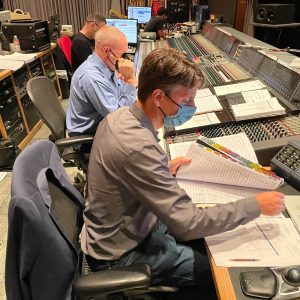
BTL: I assume Bear was more involved in the mixing stage?
Beard: We were tangentially consulting, vaguely, mainly because we were producing the orchestral sessions we needed to make sure, so Jason La Rocca, the mixer, would be in communication with us as well, to make sure that we were getting him what he needed, like types of tapes and things that he needed. But Bear was much more hands-on overseeing that.
Trybek: I believe Bear was also even more involved than a composer typically is even in mixing the music into the film, so to speak, whereas normally it’s a little bit out of their hands and maybe they have some commentary, but he was very involved. I think it shows when you watch the show that the music is very present. That’s saying a lot, and you get to hear it, which is always nice to actually hear the music when you’re watching something, at least in our unbiased opinion.
Beard: Yeah, it’s wonderful, the commitment that producers on this show have shown to the music. The music is clearly important to them.
Wilkinson: It also really gives space to the music in a way that works both to the show’s and the music’s advantage at the same time.
BTL: I know that Tom Holkenborg and Michael Abels both tend to mix MIDI stuff in with orchestral stuff, so does Bear have any MIDI things from when he’s writing that end up being used?
Trybek: There was some, but definitely not as much as what would be on a typical score these days. It was much more subtle, supportive textures, whereas, most modern scores now, it’s like, “Oh, here’s a huge synth sound or hundreds of layers of percussion.” While Bear had things programmed out and definitely some of that made it into the final mixes. His focus, at least from our point of view, was very much on the orchestra and choir and making sure to feature them. Thinking about Rings of Power, the number of exposed woodwind solos and little woodwind corrals — sorry, I’m going full-on orchestrator nerd — is the kind of thing that has definitely fallen a bit out of favor in modern film scoring, I’d say over the last 20 years. It’s nowhere near as common as it used to be.
Beard: It’s a bit more of a timeless sound, rather than a contemporary sound, and Bear really leaned into that. It’s largely acoustic and orchestral.
Wilkinson: Of course, that’s exciting to us that we have the full palette of the orchestra at our disposal, and of course, it makes our job much more exciting, as well.
Beard: The size of what you’re hearing in Lord of the Rings, that is all acoustic bodies making that glorious sound.
Trybek: It was a very large orchestra on every episode. I think Bear’s even said that typically on TV, you figure out some tricks to make your budget stretch where you’re like, “Okay, we’ll do really big on the first one and really big on the last one, and in the middle, we’ll get a little thinner.” You do kind of tricky things, but on this one, that didn’t have to happen. It was just, “No, you have a full orchestra all the time.” Whatever you need, you got it to get an uncompromised result.
Beard: We’re biased, but it sure seems that the show is better for it. It just has this glorious, epic, large sound episode-to-episode. They’re really all like small movies, and that’s how they feel as a score.
Season 1 of The Lord of the Rings: The Rings of Power is now streaming in its entirety on Prime Video, while all of Bear McCreary’s music for the series can be heard across nine separate soundtrack records.





